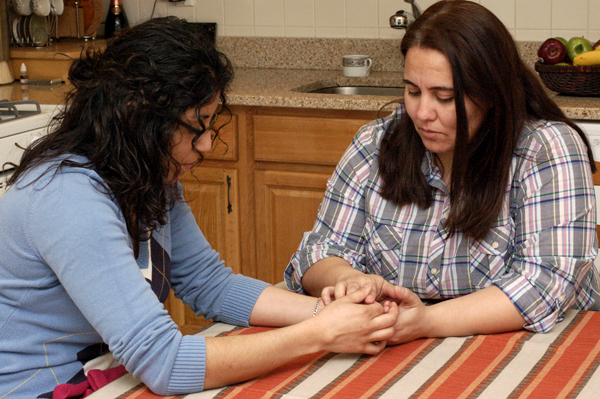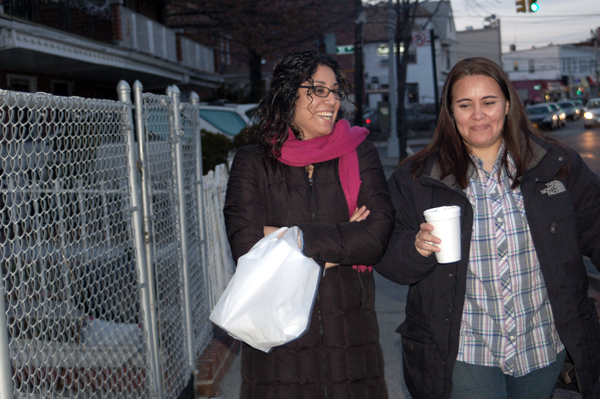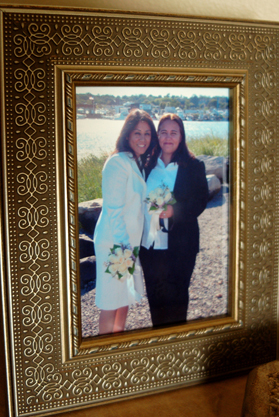
Monica Alcota (right) and Cristina Ojeda, who married last year in Connecticut, hope that DOMA will be repealed so that Ojeda can sponsor Alcota for a green card and she can remain in the United States. (Photo: Maria Watts)
President Obama’s decision to challenge the constitutionality of the Defense of Marriage Act (DOMA) came as a shock to gay rights activists and conservative lawmakers alike. The full implications of this decision remain unclear, however, and gay immigrants have been on an emotional roller coaster as rights are granted one week and denied the next.
Obama directed the Department of Justice to stop defending DOMA in court on February 23, though the actual law still remains on the books. The resulting uncertainty about DOMA’s future immediately began to influence court cases. In what appears to be a groundbreaking decision, on March 22 an immigration judge in New York delayed deportation proceedings for a lesbian immigrant in light of the president’s announcement.
Argentine immigrant Monica Alcota married Cristina Ojeda – a U.S. citizen – last summer in Connecticut and would be directly affected by a DOMA repeal. Alcota has been at risk of being deported since overstaying her tourist visa and a 2009 encounter with immigration officers that led to three months in prison. Marriage to a U.S. citizen waives visa overstay violations for heterosexual couples, but as long as DOMA remains law, same-sex couples do not have the same rights.
After their hearing, the couple sounded excited and relieved.
“In a way [the judge] is recognizing our marriage as equal,” Alcota said. According to her attorney, Lavi Solloway, this is the first time a judge has ever made such a decision. “We feel even more hope now,” she said.
But last Wednesday, United States Citizenship and Immigration Services (USCIS) retracted an earlier statement, first reported in The Daily Beast, that they would stop denying green card applications from same-sex couples and put them on hold while awaiting legal guidance after the president’s decision on DOMA. Immediately, despite Tuesday’s small court victory, Cristina and Monica’s future became less certain.
Cristina and Monica’s apartment in Queens is a spacious home decorated in soft colors. They chose the location because of its proximity to an Argentine bakery. The shelves and tabletops have framed photographs of the couple and mementos from their wedding, as well as photos of their pet rabbit and Mishe, their cat.
Monica first came to the U.S. 10 years ago, seeking a community more accepting of her sexual identity. In Argentina, Monica felt she had to hide the fact that she was a lesbian, pretending to be heterosexual by going on dates with men so as to not arouse suspicion.
She and Cristina met online in May 2008. Cristina was pursuing a masters degree in social work at the University at Buffalo. Monica lived in Queens, where she had a business called “Etched Design,” restoring antiques and making custom furniture.
After several months of long-distance, online dating, Monica surprised Cristina by traveling to Buffalo. “I wanted to see if we had a spark,” Monica said in Spanish. It turned out they did.
A year later, Cristina graduated, they discussed marriage and decided to move in together. Monica met Cristina in Buffalo, and together they traveled to New York City to begin their life together. On that trip, the U.S. Border Patrol randomly stopped the Greyhound bus they were traveling on. Cristina remembers feeling helpless, watching the officers take Monica away, unable to stop them. They arrested Monica, and took her to the Elizabeth Detention Center in Elizabeth, New Jersey.
“I felt it was the worst thing that had ever happened to me,” Monica said in Spanish, fighting back tears. “The worst.”
Monica was arrested because she had overstayed her tourist visa. She says she risked staying in the U.S. despite the expired visa because she could not bear returning to the homophobic repression she had experienced in Argentina.
During her three month incarceration, Monica and Cristina were not allowed physical contact and could only talk by phone, separated by a glass partition.
“The things she used to tell me, I couldn’t believe. She had no privacy. The toilets, they were all in the same room. There were 30 something, 40 something women in the same room. The way they used to treat them, and insult them. She couldn’t go out, they were just in this room,” Cristina said.
After she was released, Monica returned to Queens and refused to leave the house. She was depressed, and unsure of the future.
“All our plans, everything that we had talked about, everything went down the drain,” Cristina said.
The couple wept quietly as they told their story. They held hands tightly, as if to protect one another from the painful memories. Monica still has trouble talking about her imprisonment. “Every time I talk about it, it’s like I’m there again. I just can’t,” she said in Spanish.

Monica Alcota and Cristina Ojeda are directly impacted by the Defense of Marriage Act. (Photo: Maria Watts)
There are at least 35,000 same-sex bi-national couples in the U.S. according to a UCLA school of law study, many of whom have pressing immigration concerns. Last year, the lawyers at Immigration Equality, a national organization working to reform immigration law for same-sex couples, provided legal help for 597 same-sex bi-national couples, which they say is only a snapshot of all couples facing imminent separation.
Currently there are no permanent, legal solutions for couples in Monica and Cristina’s situation. Heterosexual couples in the U.S. have the right to petition for citizenship for an immigrant partner based on marriage, even if a person’s visa has expired. According to Aaron Morris, an attorney at Immigration Equality, “If a foreign national overstays a visa, and then marries a U.S. citizen in an opposite-sex union, the visa overstay is waived.”
DOMA, which defines marriage as being between a man and a woman, had not been challenged before Monica’s arrest, making it legally impossible for Cristina sponsor her for a green card. At Monica’s deportation hearing on March 22, just a month after President Obama’s announcement, Judge Terry A. Bain granted an extension to allow time for Cristina to petition for a green card in light of what appeared to be a rapidly changing legal landscape. Judge Bain delayed deportation proceedings until December, but unless DOMA is repealed and USCIS changes its green card policy, it’s likely Monica will eventually be deported.
Last year, gay marriage became legal in Argentina. If deported, the couple could potentially move there, but Cristina is upset at the prospect of leaving her native country because of her sexual orientation. “My life is here, my work is here, my family is here,” she said. “My future is here.”
The recent news regarding the Obama administration’s decision on the constitutionality of the Defense of Marriage Act came as a happy shock to Cristina and Monica. “It’s a tiny light at the end of the tunnel. Hopefully it grows and we can live in peace and in freedom. That’s what we want, and what we need,” Monica said in Spanish.
The light is indeed quite small. Obama’s recent decision regarding DOMA does not have a clear endpoint. U.S. Attorney General Eric H. Holder has stated that even though he will not defend DOMA in court, the law will remain in effect until Congress repeals it or it is overturned by the Supreme Court. In March, Senator Dianne Feinstein (D-CA) re-introduced the Respect for Marriage Act which would repeal DOMA, meanwhile, Republican legislators have pledged to support DOMA.
But Cristina and Monica remain hopeful.
“We feel positive that things are going to change,” Cristina said, “Because things need to change.”
Von Diaz is a Feet in Two Worlds LGBT reporting fellow. Her work, and the work of other Fi2W fellows, is supported by the New York Community Trust and the John S. and James L. Knight Foundation with additional support from the Mertz Gilmore Foundation.
Editor’s note: This story has been corrected to say that “Obama directed the Department of Justice to stop defending DOMA in court on February 23.” Originally it was written as “Obama directed the Department of Justice to stop enforcing DOMA in court on February 23.”





